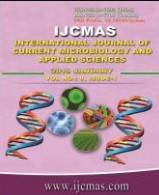


 National Academy of Agricultural Sciences (NAAS)
National Academy of Agricultural Sciences (NAAS)

|
PRINT ISSN : 2319-7692
Online ISSN : 2319-7706 Issues : 12 per year Publisher : Excellent Publishers Email : editorijcmas@gmail.com / submit@ijcmas.com Editor-in-chief: Dr.M.Prakash Index Copernicus ICV 2018: 95.39 NAAS RATING 2020: 5.38 |
Nacharam one of the NICRA (National Innovations on Climate Resilient Agriculture) cluster village belonging to Khammam (D), Telangana State consists of 7 villages i.e., Nacharam, Colony Nacharam, Gangula Nacharam, Muniya Thanda, Bhadru Thanda, Rama Thanda, Onti gudisa. The major climate challenge is drought because of deficit rainfall observed in every year. The source of irrigation for cultivation of crops is through water streams and borewells. As a result of deficit rainfall, farmers are not able to get the stable income and the livelihood of the farmers affected because of climatic conditions prevailed in the village. Moreover, in Nacharam cluster village, farmers rear the local breeds (Deshawali) which have less growth rate, less egg laying capacity and susceptible to diseases. Farmers are not able to generate good income because of the poor egg production by the desi birds, as a result farmers are very less interested to go for backyard poultry. Keeping in idea of village situation and studying the climate conditions, KVK, Wyra scientists have approached the farmers with a novel idea of rearing the new climate resilient breed (Raja Sri) as an alternative to the desi breed for income generation to the farmers and as a solution to the farmers for encouraging them towards backyard poultry under NICRA. Based on Participatory Rural Appraisal (PRA) techniques, 40 farmers were selected from 5 villages for Promoting back yard poultry by giving the “Raja Sri” birds. Each farmer was given 10 “Raja Sri” birds as a unit worth of Rs. 1000/-. The total income generated from 5 villages through combined selling of eggs and meat ranged from 1,40,550/- to 1, 68,940/- per annum and the total number of eggs ranged produced by 5 villages ranged from 35,520 to 40,960 per annum. In Nacharam Cluster of Khammam district, “Raja Sri “ birds served as an alternative additional income source to the farmers by selling the eggs and meat along with agriculture which improved their living standards.
 |
 |
 |
 |
 |